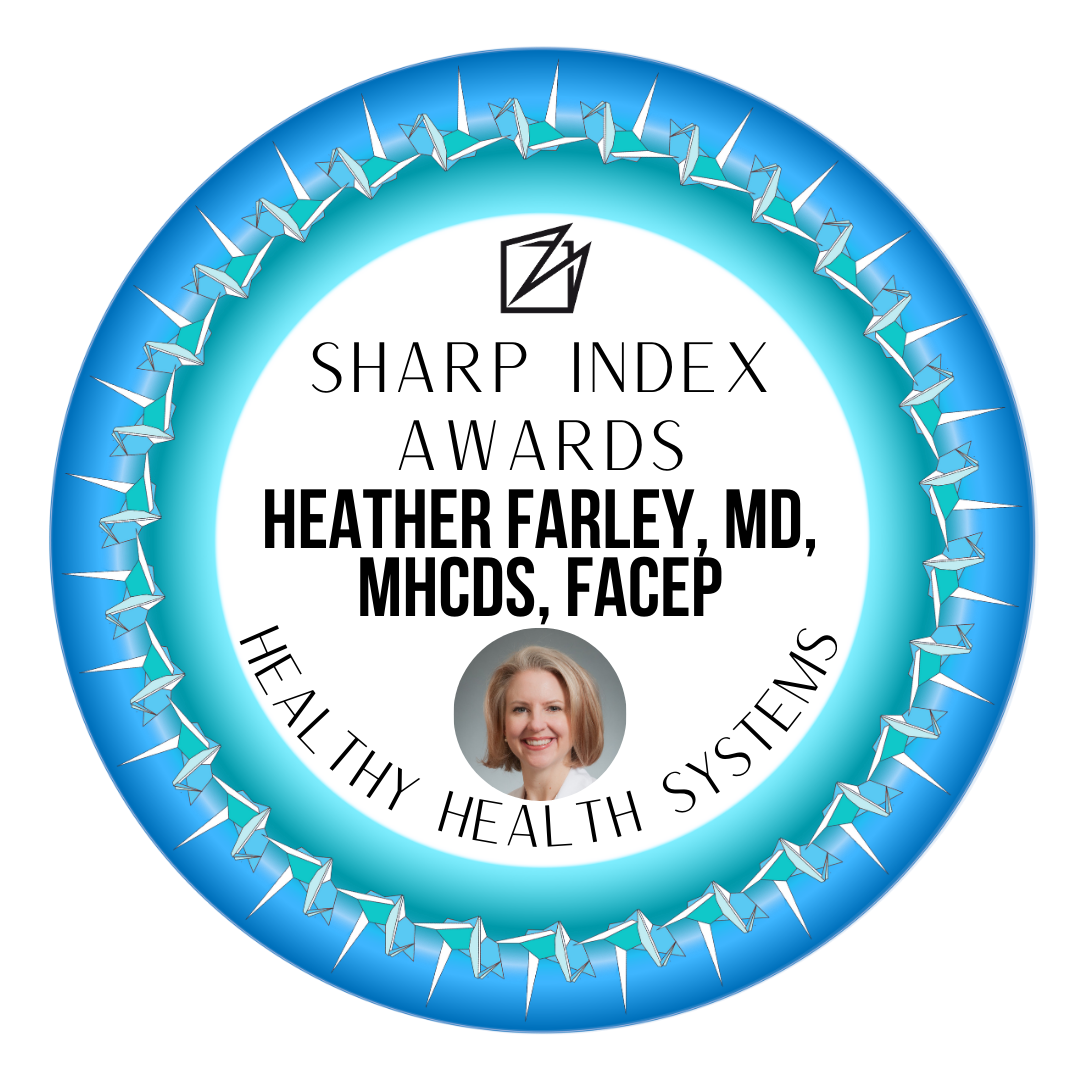
Healthy Health Care
In a year when there were more strikes and staffing issues led to the highest self-reported burnout rates and lowest trust in leadership, these systems are doing well. What programs are working? Past winners include New York Health and Hospitals for their work during the COVID19 pandemic.
Wendy Dean, MD is a champion against the moral injury of healthcare. Through decades of corporate medicine, our medical system has been taken over by financial interests and focus, to the detriment of patient care, forcing physicians to kowtow to bureaucratic requirements, as they attempt to continue to provide the care that they desperately want to give patients. This conundrum is at the heart of moral injury in medicine. Wendy, along with partner Simon Talbot, is the host of the podcast Moral Matters and author of upcoming book “If I Betray These Words: Moral Injury in Medicine and Why It’s So Hard for Clinicians to Put Patients First.” The Kirkus review describes the book as “an expert bottoms up examination of our diseased healthcare system.” In her writings and speeches, she works tirelessly to both outline the issues facing healthcare, and describe possible solutions, both within working within healthcare and looking at other methods of leadership and change in other industries that might help improve our difficulties in providing the care our patients deserve.
Penn Medicine Princeton Health takes a multifaced approach to workplace wellness and to supporting physicians and reducing physician burnout. Prior to the start of the COVID-19 pandemic, we had resources in place such as an Employee Assistance Program and a Penn Medicine program called Wellfocused that enables employees to participate in activities promoting fitness, mindfulness and overall well-being. Early in the pandemic, the Medical Staff Executive Committee began periodically using the Mayo Clinic Well-Being Index to help uncover the risk of distress and burnout among the medical staff, which comprises more than 1,370 physicians. The Well-Being Index is an online, validated self-assessment tool invented by Mayo Clinic that measures six dimensions of distress and well-being in just nine questions. While overall the tool has shown that Princeton Health physicians have lower distress scores than the national average, it has helped identify specific specialties where distress scores are higher, and with the data, the health system has been able to respond in a meaningful and impactful way. Here are some examples: • One of the groups with a higher distress score was OB-GYN. In response, a task force was formed to dive deeper into workplace issues. Several improvements have been made, including physical improvements to the Labor and Delivery Unit to provide physicians with a dedicated call room and break room and the implementation of a laborist model of care. Under this model of care, laborists are specialists who work at the hospital and are on-site 24/7 to care for women in labor and deliver babies. The American College of Obstetricians and Gynecologists (ACOG) has found that this approach has the potential to improve patient safety and professional satisfaction. • The Well-Being Index has also shown that female physicians have higher distress scores than their male counterparts. To better support female physicians, Princeton Health’s Medical Staff formed a “Women in Medicine” focus group to further examine issues and make additional recommendations, such as a peer-to-peer mentorship program. • The Well-Being Index data has also shown that mid-career physicians had higher distress scores than others. In response, we are launching a life coaching program to help physicians balance their career goals with their personal life goals. • To foster collegiality and nurture physician-to-physician relationships throughout Princeton Health, we are planning to enhance the physician lounge, which will enable physicians to sit down and interact with their colleagues in a more casual and personal way. This is in direct response to physician feedback on what would help prevent burnout. In addition to the use of the Well-Being Index and the changes implemented in response to the periodic surveys, Princeton Health also promotes and encourages the use of Penn COBALT, a digital platform launched by Penn Medicine to give physicians and other employees access to mental health and wellness content, including the Mind on Mental Health podcast produced by Penn Medicine Princeton House Behavioral Health. To date, more than 300 Princeton Health physicians and employees have used Penn COBALT. Also, early in the pandemic, pastors from the Department of Religious Ministries, along with behavioral health professionals, began making rounds on units at Princeton Medical Center to offer support to physicians and staff members. Since then, the Department has launched Schwartz Rounds, a program that offers physicians and other healthcare workers an opportunity to discuss openly and honestly the social and emotional issues they face in caring for patients and their families. Schwartz Rounds sessions are 60- minute sessions in which a multi-disciplinary panel of three to four people share about the personal impact of their professional work, typically focused on a particular case that they worked on together. Sessions are open to all members of the Medical Staff and all Princeton Health employees. Started by the Schwartz Center for Compassionate Healthcare in Boston, Schwartz Rounds is similar to Grand Rounds. However, the focus is not on how to improve clinically or give advice to the participants about how to cope. The focus is on the social and emotional experiences of caregiving. Studies from hospitals participating in the Schwartz Rounds program have shown a range of benefits, including decreased feelings of stress and isolation and more openness to giving and receiving support. Physicians at Princeton Health have offered positive feedback. “Schwartz Rounds are a way not only to decompress about the challenges of being a care provider, but they are a way to reorient to the reason that you went into the profession in the first place,” said Hospitalist and Hospitalist Medicine Section Chief Lauren Hogshire, MD. “In that sense, they are most definitely anti-burnout. I think the continued presence of Schwartz Rounds is foundational to our mission to maintain compassion in care provision, and I’ve been lucky to be a participant and physician champion.”"
Dr. Vivek H. Murthy was confirmed by the U.S. Senate in March 2021 to serve as the 21st Surgeon General of the United States. As the Nation's Doctor, the Surgeon General's mission is to help lay the foundation for a healthier country, relying on the best scientific information available to provide clear, consistent, and equitable guidance and resources for the public. And as the Vice Admiral of the U.S. Public Health Service Commissioned Corps, Dr. Murthy commands a uniformed service of over 6,000 dedicated public health officers, serving the most underserved and vulnerable populations domestically and abroad. While serving as 21st Surgeon General, Dr. Murthy is focused on drawing attention to and working across government to address a number of critical public health issues, including the growing proliferation of health misinformation, the ongoing youth mental health crisis, well-being and burnout in the health worker community, and social isolation and loneliness. Additionally, he serves as a key advisor to President Biden's COVID-19 pandemic response operation. During his previous tenure as 19th Surgeon General, under President Obama, Dr. Murthy created initiatives to tackle our country's most pressing public health challenges. The first Surgeon General of Indian descent and the youngest active duty flag officer in federal uniformed service, he helped lead the national response to a range of health challenges, including the Ebola and Zika viruses, the opioid crisis, and the growing threat of stress and loneliness to Americans' physical and mental wellbeing. Dr. Murthy also continued the office's legacy on preventing tobacco-related disease, releasing a historic Surgeon General's report on e-cigarettes and youth. And in 2016, he issued the first Surgeons General's Report on Alcohol, Drugs and Health, in which he challenged the nation to expand access to prevention and treatment, and to recognize addiction as a chronic illness, not a character flaw. Prior to his second confirmation, Dr. Murthy co-chaired President-elect Joe Biden's COVID-19 Advisory Board from November 2020 to January 2021. Before entering government service, Dr. Murthy co-founded VISIONS, a global HIV/AIDS education organization; the Swasthya Project, a rural health partnership that trained women in South India to become community health workers and educators; TrialNetworks, a technology company dedicated to improving collaboration and efficiency in clinical trials; and Doctors for America, a nonprofit mobilizing physicians and medical students to improve access to affordable care. His scientific research has focused on vaccine development and the participation of women and minorities in clinical trials. And as an internal medicine doctor at Brigham and Women's Hospital and at Harvard Medical School, Dr. Murthy cared for thousands of patients and trained undergraduates, medical students, and medical residents. Raised in Miami, Dr. Murthy received his Bachelor of Arts degree from Harvard, his MD from the Yale School of Medicine, and his Masters in Business Administration from the Yale School of Management. A renowned physician, research scientist, entrepreneur, mango aficionado, and author of the bestselling book Together: The Healing Power of Human Connection in a Sometimes-Lonely World, Dr. Murthy is today among the most trusted voices in America on matters of public health. He lives in Washington, DC with his wife, Dr. Alice Chen, and their two children.
Dr. Kavitha Reddy is currently the Associate Director of Employee Whole Health in the VHA Office of Patient-Centered Care and Cultural Transformation (OPCC & CT). She is an Emergency Medicine and Integrative Medicine physician at VA St. Louis Healthcare System in Missouri and an Assistant Professor in Emergency Medicine at the Washington University School of Medicine. She previously served for 3 years as the Whole Health System Clinical Director for the VA St. Louis Healthcare System and ten years as a National Whole Health Champion for VHA OPCC & CT. Dr. Reddy Currently serves as the PI on the VA Study, wHOPE, which focuses on Whole Health.
Dr. Heather Farley, an emergency physician by training, is one of the nation's foremost experts on healthcare worker wellbeing. Dr. Farley has personally experienced the trauma that impacts caregivers when a patient suffers an unexpected adverse event and the transformative power of supportive, evidence-based initiatives. She is passionate about advancing the professional fulfillment and wellbeing of health care providers so they can flourish at work and at home. Studies show that investing in employee wellbeing is a wise choice for health systems for a multitude of moral, ethical, and financial reasons. Dr. Farley leads advocacy programs and interventions aimed at optimizing the caregiver experience and fostering an organizational culture of wellbeing. Her mission is to restore joy and meaning in work for health care providers across the nation.





